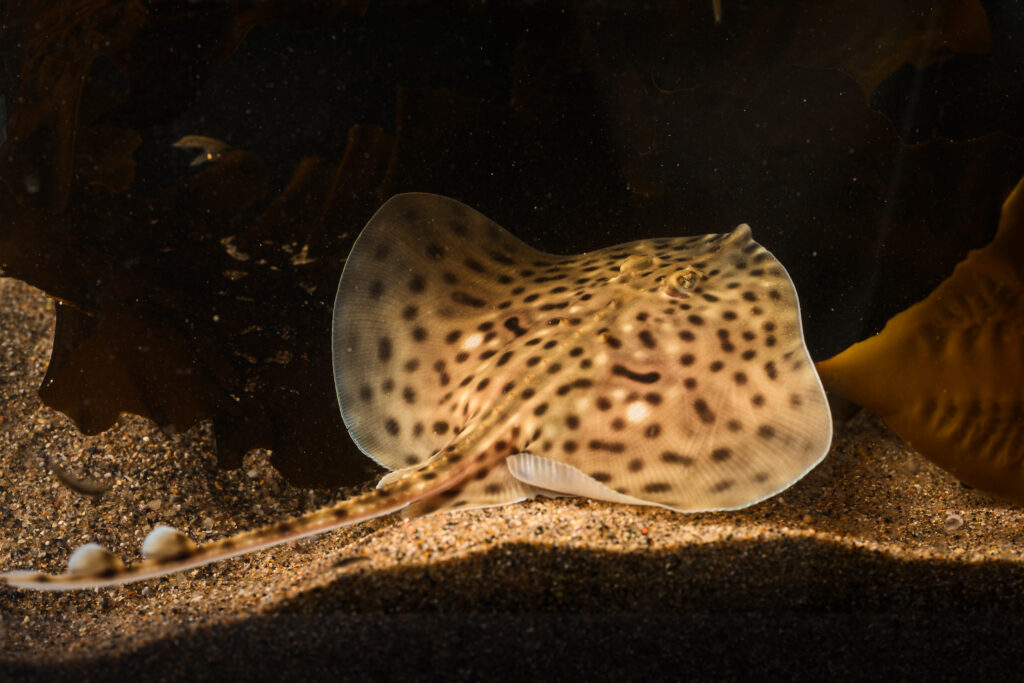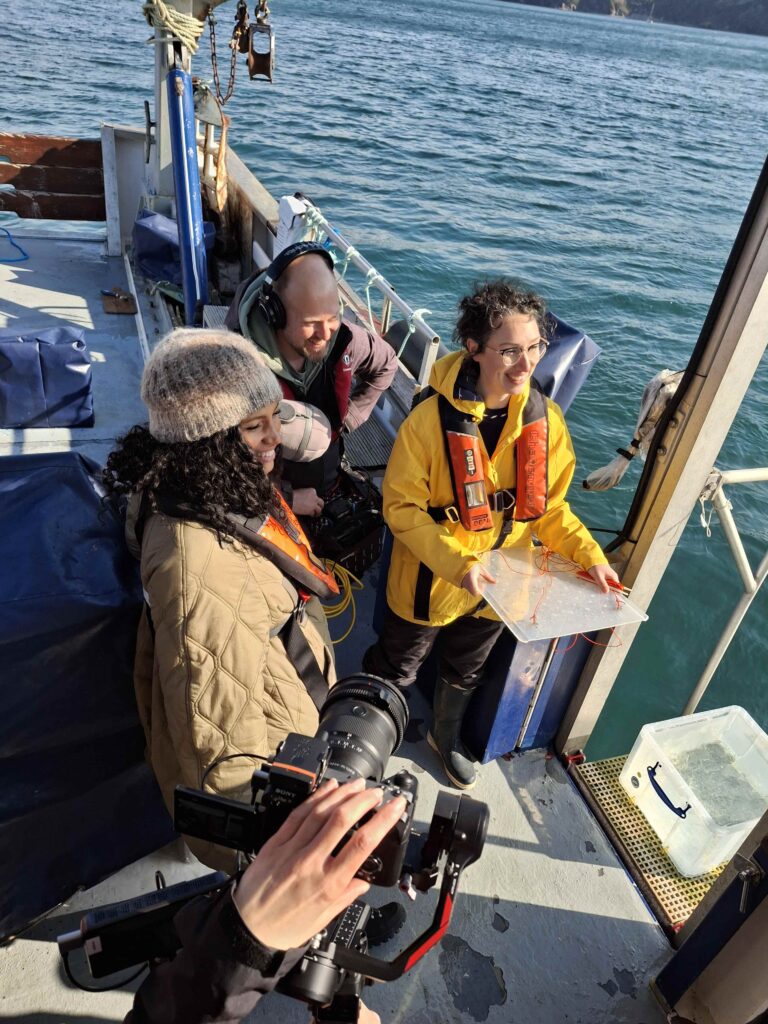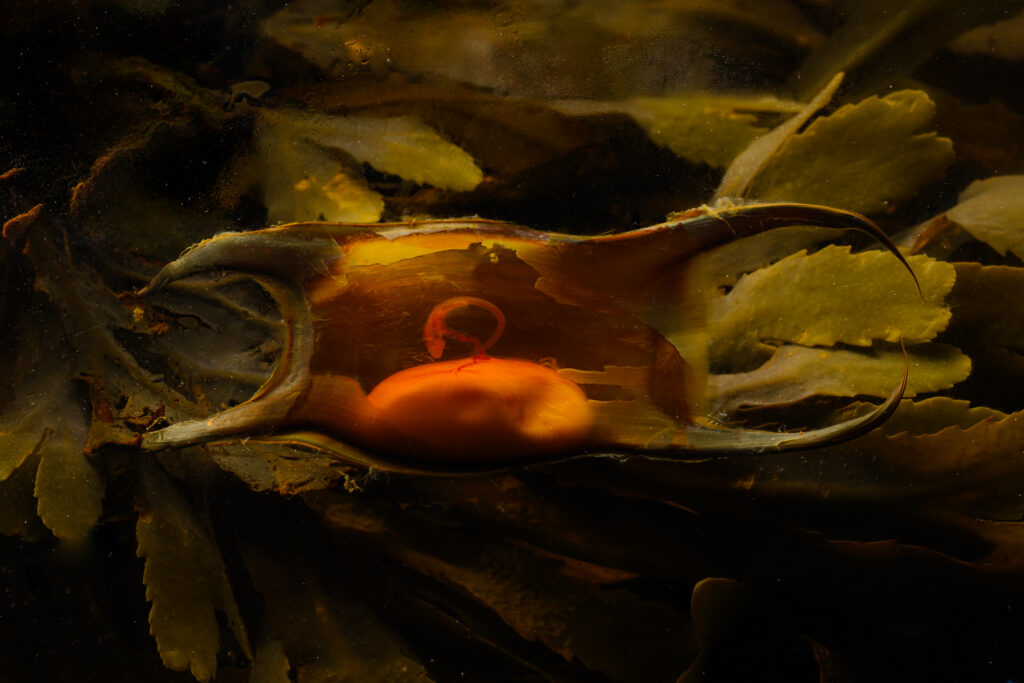In a heartening segment filmed for BBC’s Countryfile, presenter Vick Hope joined our team aboard the RV MBA Sepia for a special milestone: the release of young rays back into the waters of Plymouth Sound.

The event marks a key moment in the Little Rays of Hope project — a collaborative initiative from the Marine Biological Association (MBA) and Plymouth Sound National Marine Park, supported through the Nature Boost Programme and funded by The National Lottery Heritage Fund.
The Little Rays of Hope project aims to provide opportunities for local people to engage with these species, to learn about them, and to explore the possibility of using their spot patterns for identification, which avoids the need for tagging.
During the filming, Vick Hope joined Alix Harvey, Aquarium Manager at the MBA, and the Aquarium team aboard the MBA Sepia as they released young spotted rays (Raja montagui) into the National Marine Park. These rays had been reared in the MBA’s aquarium, offering a rare chance for people to see the species up close and learn more about their lives — from egg to pup — in a carefully monitored environment.
With the help of Countryfile, the project’s story is now reaching a national audience — shining a light on the work happening locally to foster a sense of connection with and care for the marine environment.

© Sean McTierney/Marine Biological Association
A collaborative effort to connect people with marine life
The project saw the MBA team care for four adult female rays, which laid over 50 egg cases (often called “mermaid’s purses”) in the aquarium tanks. After egg-laying, the adult rays were returned to the sea, and the aquarium team incubated the egg cases, monitoring and filming the development of the embryos until the young rays hatched.
“After around four months, we successfully hatched over 50 baby rays, and this spring we prepared 39 of them for release into Plymouth Sound,” explained Alix.
“As well as making sure the pups were growing and feeding well, we also regularly photographed their spot patterns. These patterns are unique to each individual — a bit like fingerprints — and we’re hoping this approach could support a future citizen science project, enabling people to identify rays in the wild without needing to tag them.”

Engaging communities and sparking curiosity
The Little Rays of Hope project is part of the Nature Boost Programme, which aims to create new and meaningful ways for people to experience and engage with Plymouth Sound. The project is not about increasing ray populations or altering the ecosystem — spotted rays already exist in the Sound — but about giving people the chance to learn about these animals, to see them close-up, and to understand more about their role in the marine environment.
Professor Willie Wilson, Chief Executive of the Marine Biological Association, said: “Projects like this are about inspiring people. The more connected people feel to marine life, the more likely they are to value and protect it. Sharing the journey of these young rays — from egg case to release — helps build a sense of ownership and care for the Sound.”
A wider invitation to get involved
The project also encourages community involvement through activities such as the Great Egg Case Hunt, where people can help spot and report ray and skate egg cases along the coast. These findings help build a picture of where species are breeding and how people can support local marine habitats through citizen science.
Elaine Hayes, CEO of Plymouth Sound National Marine Park, added: “By connecting the public with these animals, we hope to inspire long-term interest and responsibility for our marine environment. Little Rays of Hope is a fantastic example of how we can engage people through storytelling, science, and hands-on experiences.”
With £1 million invested over five years, the Nature Boost Programme is helping to embed marine engagement in the heart of Plymouth Sound — bringing science and community together to celebrate and explore the incredible marine life on the city’s doorstep.
Catch up with this episode of Countryfile on BBC iPlayer.